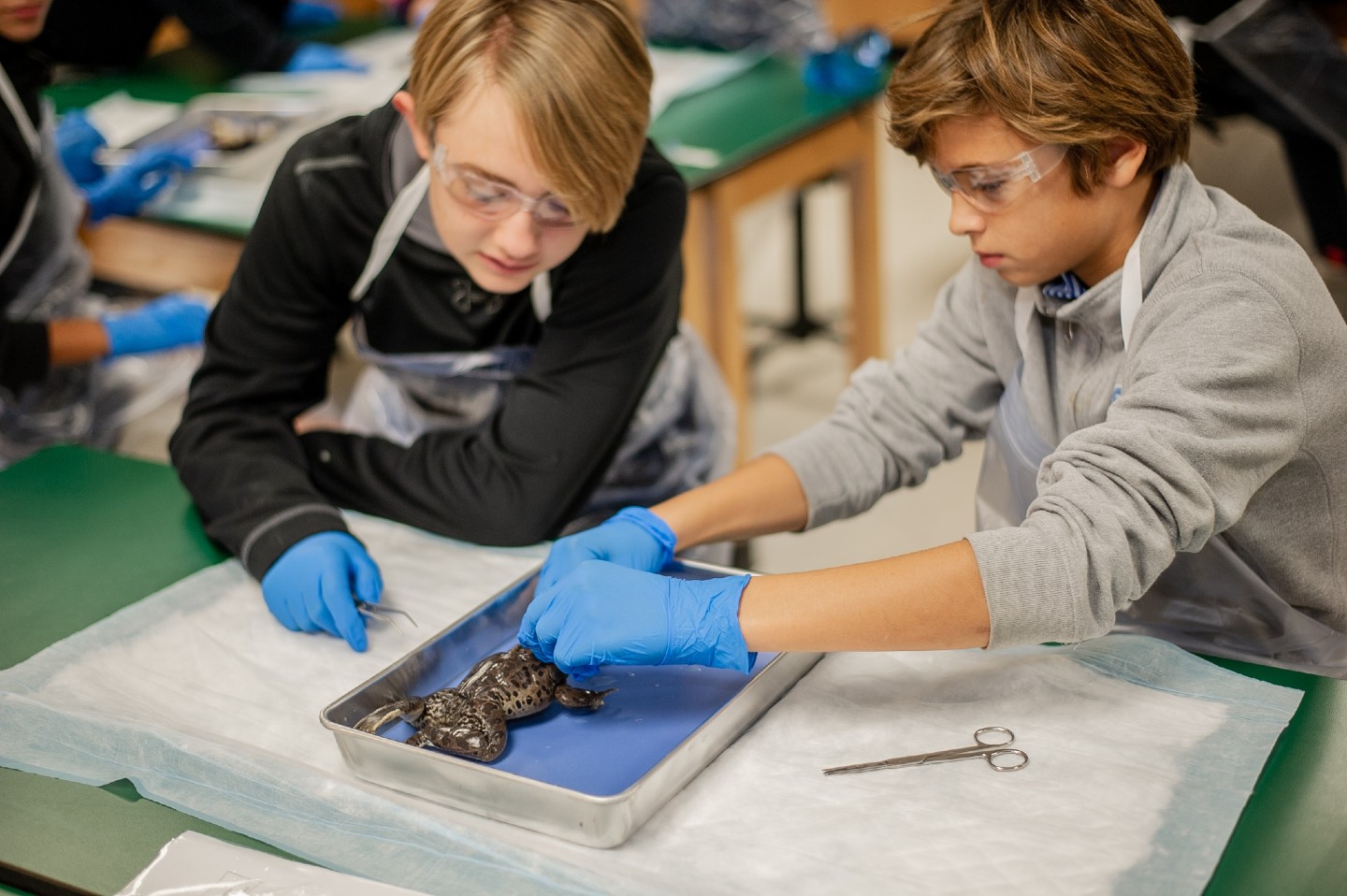Carolina offers several options that provide your students with an engaging and safe dissection experience.
Carolina’s Perfect Solution® is a combination tissue fixative and preservative that we formulated here at Carolina Biological Supply Company. This innovative way to fix and preserve tissue for dissection was developed to address the need for an alternative to formaldehyde-preserved specimens. The formula, different from anything else in use in the school marketplace, has been tested by outside testing laboratories and found to be safe and nontoxic.
Specimens preserved in Carolina’s Perfect Solution® have no formaldehyde odor. There is a biological smell associated with any preserved specimen, and there is a unique smell associated with Carolina’s Perfect Solution®. Some people consider Carolina’s Perfect Solution® specimens to be odorless, while others are more sensitive to biological and chemical smells. Ventilation is not needed for safety but does help keep biological and chemical smells to a minimum.
In addition to their advantages in safety and odor, Carolina’s Perfect Solution® dissection specimens are superior in quality, with tissues and organs retaining better color and texture than with any other preparation. Various other suppliers offer “formalin-free” specimens, but we have not seen any of them yield the results that we have achieved with Carolina’s Perfect Solution® specimens.
Carosafe®
Carosafe® preservative and holding solution for biological specimens contains no formaldehyde and is not a tissue fixative. Most Carosafe® specimens were first preserved with a formalin solution and then washed before placement in Carosafe®. This produces a formalin-preserved specimen that, when dissected, minimizes formaldehyde exposure.
The primary component of Carosafe® is propylene glycol, a common additive to cosmetics and foods. Propylene glycol is on the U.S. Food and Drug Administration (FDA) list of food additives generally recognized as safe. Holding specimens in Carosafe® reduces the presence of formaldehyde, diminishing unpleasant odor. However, Carosafe®-preserved specimens and their surrounding fluid do contain some residual formaldehyde, a by-product of the initial formalin preservation process. The residual amount varies by specimen type.
Preserved specimen packaging and storage
If you are planning a dissection activity that will take place over several classroom or lab periods, it is very important to store your specimens properly to ensure they remain as fresh as possible. Carolina offers specimens in a variety of different packaging options to help meet your needs.
Pail-packed specimens
Pails are ideal for long-term storage because the specimens are kept immersed in preservation fluid. These specimens are available in 1- to 5-gal pails sealed with leak-proof, reusable lids. For long-term storage, return the specimens to the pail after use. Make sure the pail contains enough preservation fluid to cover the specimens, and seal it with the reusable lid. You may want to purchase a pail opener to make opening and closing your pail easier.
Vacuum-packed specimens
These are packaged in vacuum-sealed, triple-layered, plastic barrier bags with either one or many specimens per bag. One-per-bag packaging is ideal for convenience (so that individual students or teams can easily rebag and keep track of their specimen over a few days of dissection). Bulk bag packaging (many per bag) is great for teachers who want to use multiple specimens at once. After opening, vacuum-packed specimens can be stored by returning them to the original shipping bag, folding the top down and securing with binder clips, and then placing the bag in a separate resealable bag. Note: Vacuum-packed specimens are lighter and more economical to ship than pail-packed specimens–something to consider if you are on a tight budget.
No. Specimens can be kept at room temperature, out of direct sunlight, and in their original packaging. If the original packaging has been opened or discarded, repackage the specimens in a sealable bag or pail.
Many specimens can be stored for years under the right conditions. If you plan to store yours for more than a yearor to use them over an extended period of time after opening, we recommend that you purchase pail-packed specimens. Because they are immersed in preservative fluid, they remain in good condition longer.
Yes. If the specimens are packed in single or bulk bags, the fluid will begin to drain from the specimens and pool in a corner of the bag over time. This is normal and will not harm the specimens. For longer-term storage, we recommend purchasing pail-packed specimens.
No. Adding water will dilute the preservative and cause mold to grow on the specimens. If you need more fluid for your pails, please contact a Carolina customer service representative at 800.334.5551.
We do offer quantity discounts on specimens packaged in bulk bags and pails.
Preserved specimen disposal
Disposal of preserved specimens and preservation fluids after use is not complicated but does require some thoughtful planning. If you have questions not addressed below, please email Keith Barker at keith.barker@carolina.com, or phone him at 336.538.6377 or 800.334.5551, ext. 6377.
Specimens
Specimens preserved in Carosafe® or Carolina’s Perfect Solution® can, in most cases, be disposed of in a school’s regular waste destined for a landfill or incinerator. The specimens are not classifiable as federal hazardous waste and do not represent a biohazard. However, you should check with your local solid waste authority (local governmental authority in charge of solid waste, local landfill, or waste disposal company if applicable) to ensure that this is an acceptable practice. If it is, we recommend that you double bag the specimens before placing them in your school’s regular waste.
Preservative fluids
Often with preserved specimens in pails of Carosafe® or Carolina’s Perfect Solution®, the fluids can be safely discharged into a sanitary sewer system. Neither fluid is classified as a federal hazardous waste, and the quantities are generally small. However, you should check with the local wastewater authority (local governmental authority in charge of wastewater treatment or the supervisor of the wastewater treatment plant) to make sure that this is acceptable practice. If it is, simply pour the fluids into a sink and flush them down the drain with running water. Carolina’s Perfect Solution® is a proprietary product whose formulation is a protected trade secret, and we are unable to provide component information for disposal decisions; however, we can work with local authorities to verify that materials of special concern to them are not present in the solution.
Caution: If your school is equipped with its own septic system or aerobic waste treatment system, seek advice from a supervisor or administrator before discharging Carosafe® or Carolina’s Perfect Solution® into it. Even these safe chemicals may upset the microbiological balance important to the proper functioning of these systems.
Pregnancy and dissection of Carolina Perfect Solution® and Carosafe® specimens
It appears that exposure to Carolina’s Perfect Solution® and Carosafe® specimens should not pose a significant risk to an expectant mother or her unborn child. If a pregnant woman observes standard safety procedures when dissecting Carolina’s Perfect Solution® and Carosafe® specimens, i.e., wears gloves, apron, and splash goggles and works in a well-ventilated area, there appears to be limited cause for concern.
That being said, pregnancy is such a special circumstance that we always advise a pregnant woman to discuss the matter with her physician, and to think seriously about whether or not she wants to expose herself unnecessarily to any chemical, regardless of its apparent safety. We also encourage schools to undertake this same careful approach when considering whether or not to allow or require pregnant staff or students to participate in dissection activities.
More information
If you need any further assistance, please contact Customer Service. Call us at 800.334.5551 or Live Chat us on carolina.com.


